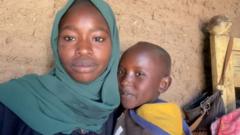Kamel Daoud’s novel "Houris," narrating Algeria’s tumultuous 1990s civil war, secures the Goncourt award, yet its implications raise alarms about censorship and historical recognition in Algeria.
Algerian Author’s Landmark Goncourt Win Sparks Silence at Home

Algerian Author’s Landmark Goncourt Win Sparks Silence at Home
Kamel Daoud’s novel about Algeria’s civil war earns France’s prestigious literary honor while prompting concern over the country’s historical amnesia.
In an unprecedented achievement, Algerian author Kamel Daoud has clinched France’s prestigious Goncourt prize for his novel "Houris," which recounts the harrowing experiences during Algeria's violent civil war of the 1990s. This period, often referred to as the "dark decade," is marked by the loss of an estimated 200,000 lives, with atrocities attributed to both Islamist militants and government forces.
The book's protagonist, Fajr, a survivor of a brutal attack, conveys her trauma to the unborn child she carries—a poignant metaphor for the generational scars left by conflict. The Goncourt committee praised Daoud's work for illuminating the suffering during this dark chapter, particularly emphasizing the often-overlooked experiences of women.
However, the reception of "Houris" within Algeria is anticipated to be muted, if not entirely absent. Daoud’s work lacks a local publisher, and the French publishing house Gallimard was barred from participating in the Algiers Book Fair, limiting accessibility. As of a day following the award announcement, the Algerian media has yet to cover Daoud's achievement, casting a shadow over the recognition he has garnered internationally.
Daoud’s comments highlight a broader societal issue. A 2005 law in Algeria criminalizes discussions that “instrumentalize” the nation’s historical wounds, leading to a pervasive culture of silence surrounding the civil war. As Daoud recounted in a recent interview, such suppression has resulted in a lack of awareness about the conflict even among younger Algerians. His own daughter was incredulous upon learning about the war, as it is rarely addressed in educational curricula.
Having experienced the conflict firsthand as a journalist, Daoud has been candid about the horrific realities he witnessed. His journey as a writer has been fraught with challenges, particularly as he grew increasingly critical of governmental narratives surrounding both the civil war and Algeria's historical struggle for independence from French colonial rule.
While Daoud has faced considerable backlash within Algeria—some branding him a traitor for his outspoken views—others herald him as a literary genius deserving of national pride. He has expressed aspirations that "Houris" may inspired critical reflection on the cost of freedom, particularly for women in Algerian society.
Since relocating to France in 2020, Daoud has embraced his role as an expatriate, arguing that the freedom he discovered in France allowed him to write authentically about Algeria. He articulated his belief that, “To write you need three things: a table, a chair, and a country," all of which he feels he has found in his adopted homeland.
As "Houris" gains international acclaim, the conversation surrounding its content must navigate the complexities of historical memory and identity, particularly the narratives that remain muted in a nation still grappling with its recent past.
The book's protagonist, Fajr, a survivor of a brutal attack, conveys her trauma to the unborn child she carries—a poignant metaphor for the generational scars left by conflict. The Goncourt committee praised Daoud's work for illuminating the suffering during this dark chapter, particularly emphasizing the often-overlooked experiences of women.
However, the reception of "Houris" within Algeria is anticipated to be muted, if not entirely absent. Daoud’s work lacks a local publisher, and the French publishing house Gallimard was barred from participating in the Algiers Book Fair, limiting accessibility. As of a day following the award announcement, the Algerian media has yet to cover Daoud's achievement, casting a shadow over the recognition he has garnered internationally.
Daoud’s comments highlight a broader societal issue. A 2005 law in Algeria criminalizes discussions that “instrumentalize” the nation’s historical wounds, leading to a pervasive culture of silence surrounding the civil war. As Daoud recounted in a recent interview, such suppression has resulted in a lack of awareness about the conflict even among younger Algerians. His own daughter was incredulous upon learning about the war, as it is rarely addressed in educational curricula.
Having experienced the conflict firsthand as a journalist, Daoud has been candid about the horrific realities he witnessed. His journey as a writer has been fraught with challenges, particularly as he grew increasingly critical of governmental narratives surrounding both the civil war and Algeria's historical struggle for independence from French colonial rule.
While Daoud has faced considerable backlash within Algeria—some branding him a traitor for his outspoken views—others herald him as a literary genius deserving of national pride. He has expressed aspirations that "Houris" may inspired critical reflection on the cost of freedom, particularly for women in Algerian society.
Since relocating to France in 2020, Daoud has embraced his role as an expatriate, arguing that the freedom he discovered in France allowed him to write authentically about Algeria. He articulated his belief that, “To write you need three things: a table, a chair, and a country," all of which he feels he has found in his adopted homeland.
As "Houris" gains international acclaim, the conversation surrounding its content must navigate the complexities of historical memory and identity, particularly the narratives that remain muted in a nation still grappling with its recent past.




















